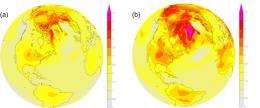Study: Earth more sensitive to carbon dioxide than previously thought

In the long term, the Earth's temperature may be 30-50% more sensitive to atmospheric carbon dioxide than has previously been estimated, reports a new study published in Nature Geoscience this week.
The results show that components of the Earth's climate system that vary over long timescales - such as land-ice and vegetation - have an important effect on this temperature sensitivity, but these factors are often neglected in current climate models.
Dan Lunt, from the University of Bristol, and colleagues compared results from a global climate model to temperature reconstructions of the Earth's environment three million years ago when global temperatures and carbon dioxide concentrations were relatively high. The temperature reconstructions were derived using data from three million-year-old sediments on the ocean floor.
Lunt said, "We found that, given the concentrations of carbon dioxide prevailing three million years ago, the model originally predicted a significantly smaller temperature increase than that indicated by the reconstructions. This led us to review what was missing from the model."
The authors demonstrate that the increased temperatures indicated by the reconstructions can be explained if factors that vary over long timescales, such as land-ice and vegetation, are included in the model. This is primarily because changes in vegetation and ice lead to more sunlight being absorbed, which in turn increases warming.
Including these long-term processes in the model resulted in an increased temperature response of the Earth to carbon dioxide, indicating that the Earth's temperature is more sensitive to carbon dioxide than previously recognised. Climate models used by bodies such as the Intergovernmental Panel on Climate Change often do not fully include these long-term processes, thus these models do not entirely represent the sensitivity of the Earth's temperature to carbon dioxide.
Alan Haywood, a co-author on the study from the University of Leeds, said "If we want to avoid dangerous climate change, this high sensitivity of the Earth to carbon dioxide should be taken into account when defining targets for the long-term stabilisation of atmospheric greenhouse-gas concentrations".
Lunt added: "This study has shown that studying past climates can provide important insights into how the Earth might change in the future."
More information: Earth system sensitivity inferred from Pliocene modelling and data by Daniel J. Lunt, Alan M. Haywood, Gavin A. Schmidt, Ulrich Salzmann, Paul J. Valdes and Harry J. Dowsett. Published online in Nature Geoscience on 6 December 2009.
Source: University of Bristol (news : web)















